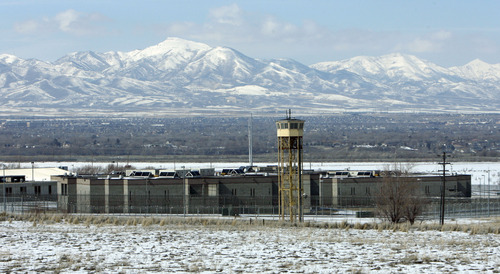This is an archived article that was published on sltrib.com in 2013, and information in the article may be outdated. It is provided only for personal research purposes and may not be reprinted.
With virtually no debate, the Utah Senate approved a fourth version of a bill Tuesday evening to seek bids from companies interested not only in relocating the state prison — but also inviting proposals for operating it.
The heavily revamped SB72S4, sponsored by Sen. Scott Jenkins, R-Plain City, says the request for proposals "may include" bids to build a new prison as well as oversee its programming and operation.
Jenkins said the language about private operation of the prison was inserted into the measure about a week ago. Placed deep within what was then a 30-page bill, the provision received little attention and hasn't figured into the public debate. The latest version of the bill, which appeared Tuesday, is just six pages long.
Bidders would be required to "identify and quantify" funds that make a new prison financially feasible, including land sales, deferred maintenance and construction expenses, and savings from reduced operational and labor expenses. They also must specify amount of bonds, legislative appropriations and financing provided by the developer.
SB72S4 would use the same board structure set up by the Legislature last year to seek, review and select proposals to relocate the existing prison and tear down the old one in Draper. That board — the Prison Relocation and Development Authority — found the project was economically feasible. At least three companies who submitted initial information packets last year to PRADA have experience in operating prison facilities, either solely or in partnership with government.
Under its proposed new duties the board also would recommend to the governor and legislative leaders a "master development project" for the 690 acres the facility now occupies.
The plan also would have to be approved by the full Legislature.
Three Republicans — Wayne Harper, David Hinkins and Lyle Hillyard — joined four Democrats in voting against the bill. Hillyard said he was concerned about the process and wanted independent advisers to monitor it.
Senate President Wayne Niederhauser, R-Sandy, was among the 19 senators who voted for the bill. Niederhauser acknowledged last week his real estate development business owns a housing project four miles from the current prison but denied any conflict of interest or potential benefit. Niederhauser is the handpicked successor of former Senate President Al Mansell, who has pushed for prison relocation beginning two years ago.
Asked about anticipated costs, Jenkins, the bill sponsor, said: "The fiscal note will have to catch up to the bill."
The proposal keeps intact some — but not all — changes the Senate made to the bill on Monday, when it moved to lessen the governor's control over the composition of the initially proposed executive board.
The Senate also scrapped a provision that would have allowed PRADA to divert up to 50 percent of tax revenue from new development on the current prison site to pay for the project.
One senator characterized that as a "gift" to project bidders and out-of-step with the normal process for approving tax increment financing; another said it amounted to an "entitlement."
Jenkins had identified revenue sharing as one of the "tools" for funding a new, $550 million to $600 million prison outside the Salt Lake Valley's urban corridor. Other funds would come from selling the current prison acreage for $100 million to $140 million; annual operational and labor savings estimated at $17 million to $20 million; and deferred maintenance of about $3 million a year.
The Governor's Office of Economic Development has projected that in time, commercial development at the site could create up to 40,000 jobs and generate up to $20 billion in tax revenue over 20 years — an economic impact that justifies moving the prison.
But senators made clear on Monday building a new prison should be a self-funding project, accomplished through savings rather than tax revenue. "If it doesn't pencil without this tax-increment funding, I really don't believe we should do it," said Sen. Mark Madsen, R-Eagle Mountain.
SB72 now will begin to work its way through the House, which passed a resolution on Tuesday encouraging the state to rely more on county jails to handle growing numbers of inmates and rising incarceration costs as part of considering whether to build a new prison facility.
The Utah Department of Corrections currently contracts with 20 county jails, which together house more than 20 percent of state inmates. The department expects to use jails to handle future growth, which it estimates at 24 female inmates and 108 male inmates per year. Some counties — such as Beaver, San Juan, Kane and Millard — now provide substance abuse and sex offender programming.
Twitter: @brooke4trib —
Bill language would allow proposals for private prison
"A request for proposals for a new prison development project: may include a request for prison programming proposals; and shall allow an offeror to include, as part of the proposal, the operation of the new prison. A person submitting a proposal for a new prison development project may include, as part of the proposal, prison programming proposals; or the operation of a new prison."



